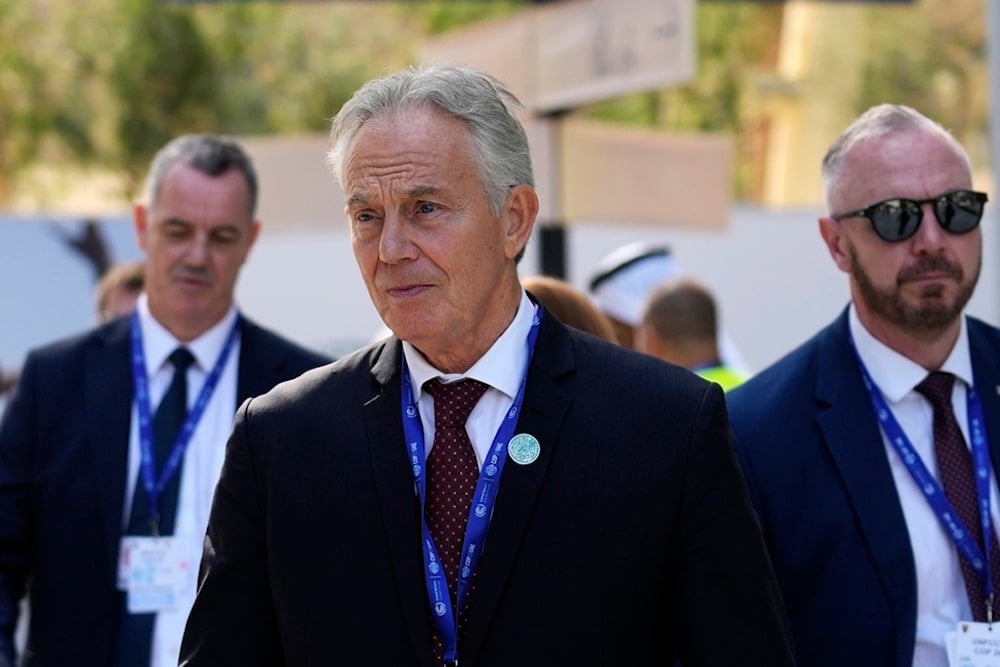White House backs plan for Tony Blair to lead interim Gaza authority
The White House supports a plan for Tony Blair to head a Gaza transitional authority, raising controversy over timelines, Palestinian statehood, and Arab backing.
-

Britain's former Prime Minister Tony Blair walks through the COP28 UN Climate Summit, Sunday, December 3, 2023, in Dubai, United Arab Emirates. (AP)
The White House is reportedly supporting a proposal that would place former UK Prime Minister Tony Blair at the helm of a temporary administration to govern the Gaza Strip, according to reports in Haaretz and The Times of Israel, which completely sidelines the demands and stances of the Palestinian people.
The plan envisions the creation of the Gaza International Transitional Authority (GITA), which would act as Gaza’s “supreme political and legal authority” for up to five years. Blair would lead a 25-member secretariat and chair a seven-person board overseeing an executive body responsible for managing the territory.
Initially based in the Egyptian city of El-Arish, GITA would later move into Gaza, accompanied by a UN-endorsed multinational force largely drawn from Arab states. The proposal is modeled on transitional administrations that previously oversaw Kosovo and Timor-Leste.
The White House argues the initiative offers a middle ground between US President Donald Trump’s earlier proposal for the US and the Israeli regime to directly control Gaza and a UN-backed plan endorsed by over 140 states calling for a one-year technocratic administration under the New York declaration.
Divisions over Blair’s role
Blair’s potential appointment is controversial, for while he enjoys credibility among several Gulf leaders, many Palestinians view him with deep mistrust due to his support for the 2003 US-led invasion of Iraq and his record as Middle East envoy from 2007 to 2015. Western diplomats noted it was not guaranteed that Blair would take on the role and suggested the administration could last only two years.
The proposal’s lack of a clear timeline for transferring authority to the Palestinian Authority (PA) may complicate its acceptance by Palestinians and Arab leaders. Critics fear the plan could amount to another form of foreign-imposed governance, albeit under an international framework rather than the Israeli occupation.
Details of the plan surfaced after Trump met in New York with Qatar’s Emir Sheikh Tamim bin Hamad Al Thani, Saudi Foreign Minister Prince Faisal bin Farhan Al Saud, Jordan’s King Abdullah II, Indonesian President Prabowo Subianto, and Turkish President Recep Tayyip Erdogan. Trump described the discussions as “successful", adding that “we’re close to getting some kind of deal done.”
Arab states have stressed that any international involvement must be tied to a credible timeline for Palestinian statehood. Without such assurances, some argue the Blair-led body risks being perceived as an extended foreign trusteeship.
Palestinian response
Addressing the UN General Assembly, PA President Mahmoud Abbas reaffirmed that Gaza remains “an integral part of the state of Palestine” and said the PA was ready to assume full responsibility for governance and security. He rejected any role for Hamas in postwar administration, echoing US and Israeli conditions after Washington revoked his visa ahead of the 80th UN session, which forced him to deliver his speech via video.
Meanwhile, Trump told reporters at the White House that he would not support the Israeli occupation's "annexation" of the West Bank. “I will not allow Israel to annex the West Bank. Nope. I won’t allow it. It’s not going to happen,” he said.
Arab and Muslim forces in Gaza?
Washington is pushing for Arab and Muslim states to commit troops to Gaza as part of a so-called peacekeeping force that would enable an Israeli withdrawal. The US is also seeking financial pledges from these countries for reconstruction and to support Gaza’s transitional administration.
On Monday, Indonesian President Prabowo Subianto announced that his country was prepared to send soldiers as part of such a mission.
The initiative comes as negotiations to end the war and secure a prisoner exchange remain stalled. On the ground, "Israel" has launched a large-scale offensive, deploying three armored and infantry divisions into Gaza City, in hopes of forcibly displacing the city's residents.
Meanwhile, at UN headquarters in New York, a conference on the "two-state solution" concluded with France and several European countries recognizing the State of Palestine. The Gaza Ministry of Health reports that more than 65,000 Palestinians, most of them civilians, have been killed in the Israeli assault since October 7.
An Israeli plan relayed to Washington?
A US official told Axios that “tomorrow’s meeting could be fairly significant,” stressing that the Trump administration wants “regional buy-in and support to make it successful.” An Arab official added that Trump is seeking “feedback and support for the US plan to end the war and then push it forward.”
Officials insisted the proposal would be a US initiative rather than an Israeli plan relayed through Washington. However, Israeli officials acknowledged that Prime Minister Benjamin Netanyahu is aware of its outlines.
One Israeli official admitted that “there will be bitter pills we’ll have to swallow,” particularly regarding any potential role for the Palestinian Authority in Gaza.

 5 Min Read
5 Min Read








